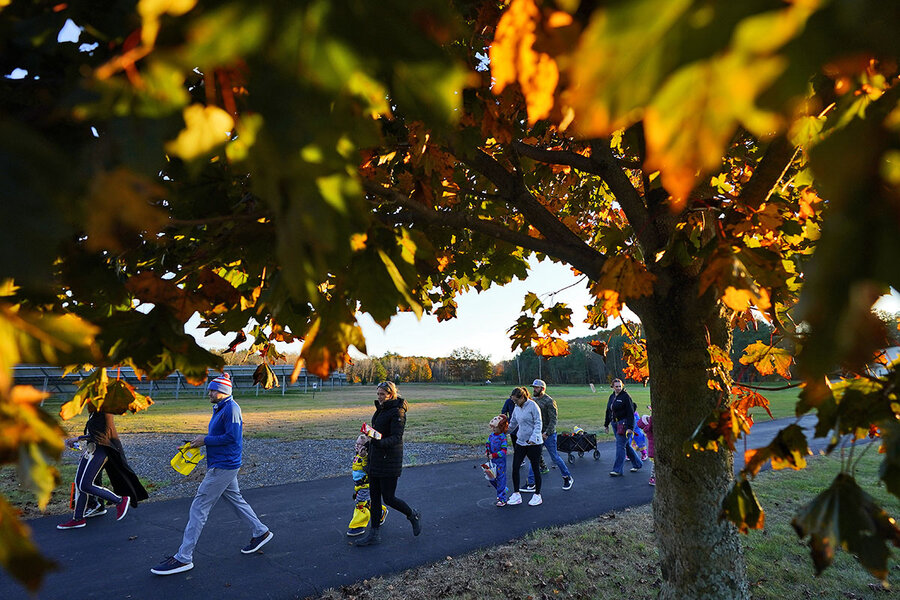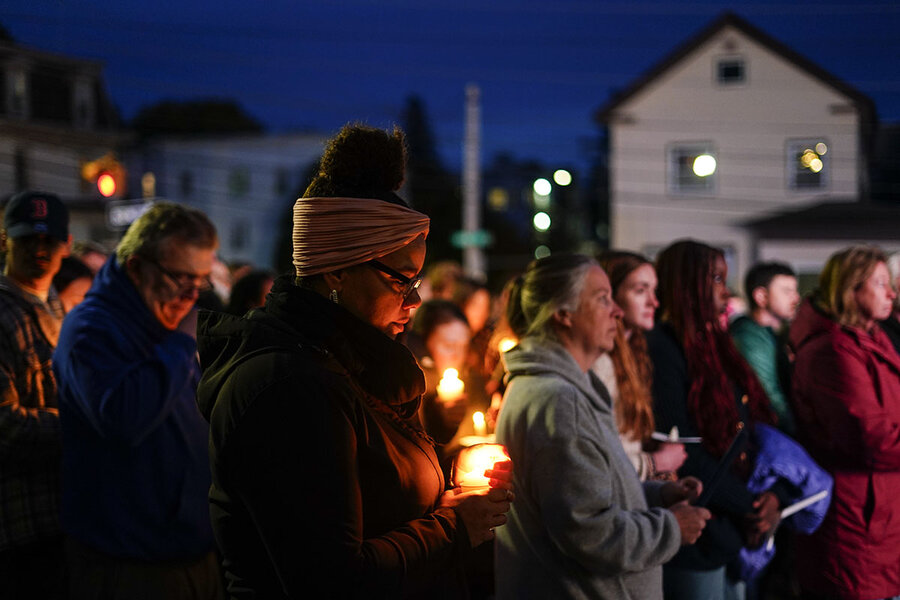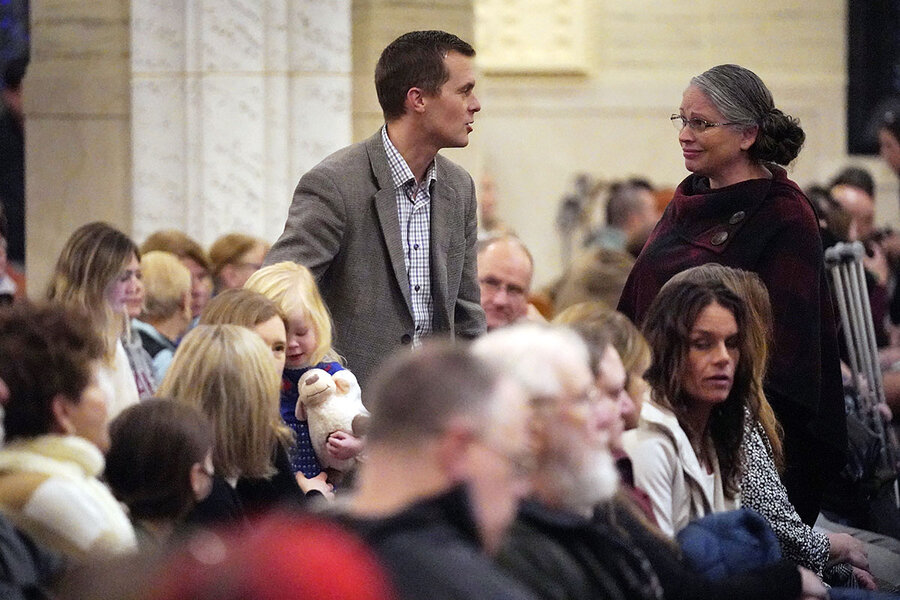Americans have a right to guns. How about to public peace?
Loading...
For years, mass shootings have prompted vehement debates in legislatures and at kitchen tables about the constitutional right to bear arms. But last week’s shootings in Lewiston, Maine, have given momentum to a national conversation about something more fundamental: the right to a reasonable sense of peace.
Gun rights advocates argue that guns are a symptom and not a cause of the problem. But a majority of Americans say gun laws should be tougher than they are now. And mass shootings have led to states and cities seeking ways to regulate certain guns. Now, the question in Maine and beyond is to what degree communities like Lewiston can decide for themselves how best to create a sense of peace.
Why We Wrote This
A story focused onIn recent years, U.S. court rulings have expanded gun rights. But in the wake of the mass shootings in Maine, there’s another legal principle at stake – the right to live in peace.
“This question of living free from terror ... [and] living free of being shot, that is one of the most important things in the modern gun debate, and that is starting to be vocalized more powerfully,” says Joseph Blocher, a professor at Duke University School of Law in Durham, North Carolina.
The idea of safeguarding peace has long been accepted as having a place in U.S. constitutional law, as an extension of English common law, Professor Blocher says. “The common law tradition absolutely protected government’s power to prevent terror and intimidation.”
For years, mass shootings have prompted vehement debates in legislatures and at kitchen tables about the constitutional right to bear arms. But last week’s killings by a shooter in Lewiston, Maine, have given momentum to a national conversation about something more fundamental: the right to a reasonable sense of peace.
At a time when the United States Supreme Court is expanding gun rights, many Americans are asking what peace in their communities looks like.
Gun rights advocates argue that guns are a symptom and not a cause of the problem. They worry that eroding one constitutional liberty could be a slippery slope to an erosion of others. But a majority of Americans say gun laws should be tougher than they are now, according to Gallup. And mass shootings have led to states and cities seeking ways to regulate certain guns.
Why We Wrote This
A story focused onIn recent years, U.S. court rulings have expanded gun rights. But in the wake of the mass shootings in Maine, there’s another legal principle at stake – the right to live in peace.
The way forward is uncertain, as communities and courts feel their way through the new landscape the Supreme Court is creating. For many in Maine, the state’s tightly knit communities were seen as its best defense against mass shootings. Now, the question in Maine and beyond is to what degree communities like Lewiston can decide for themselves how best to create a sense of peace.
“This question of living free from terror ... [and] living free of being shot, that is one of the most important things in the modern gun debate, and that is starting to be vocalized more powerfully,” says Joseph Blocher, a professor at Duke University School of Law in Durham, North Carolina.
The idea of safeguarding peace has long been accepted as having a place in U.S. constitutional law, as an extension of English common law, Professor Blocher says. “The common law tradition absolutely protected government’s power to prevent terror and intimidation.”
Shaking a state’s sense of safety with guns
The question is particularly pertinent for Maine, which has long seen itself as taking a middle line on guns. Known as a sportsman’s paradise, it has some of the highest rates of gun ownership and lowest crime rates in the union. Mainers have long felt a sense of immunity from mass violence. The Lewiston shooting shattered that sense of peace.
“We have had a very responsible approach to guns,” says Richard Judd, a historian at the University of Maine. “Fathers would train their kids. Farmers depended as much on game and forage as they did their crops to survive. It was just a way of life. So guns as a defense is really less important here than guns as a form of independence.”
One of those who has changed his views is U.S. Rep. Jared Golden, a Democrat and former Marine from Lewiston. He has vowed to work toward passing a national assault weapons ban. Mr. Golden said his past reluctance to support such a ban came in part from “a false confidence that our community was above this.”
But the ability of communities like Lewiston and states like Maine to set local standards is balanced against U.S. Supreme Court rulings since 2008 favoring gun rights. U.S. District Judge Robert Benitez cited a 2022 Supreme Court ruling – which required a historical analogue to any proposed restriction on the Second Amendment right “to keep and bear Arms” – when striking down California’s assault weapons ban in mid-October. The ruling is currently under appeal.
The debate in Maine is further complicated by questions surrounding authorities’ response to warnings they received months ago about Robert Card, the alleged shooter. A recently passed “yellow flag” law was not activated despite his documented mental health struggles and threats.
To gun rights advocates, gun control is a false bargain; they say tougher laws wouldn’t prevent mass shootings.
Next week, the Supreme Court will hear the case of a Texan who challenged the seizure of his weapons in 2020 after being placed under a restraining order for domestic abuse. His argument – calibrated for last year’s Supreme Court ruling – is that there were no laws against domestic abuse in 1791. A lower court agreed.
Here is where gun control advocates and communities looking to pass gun control regulations say the Supreme Court must draw a line. In the past, the Supreme Court has upheld the ability of jurisdictions to seize weapons from people involved in restraining orders. A study in Injury Epidemiology found that nearly 60% of mass shootings between 2014 and 2019 were related to domestic violence.
“An unwillingness to look at legislative reasoning behind these gun [restrictions] is such a dangerous path to go down,” says Margaret Groban, a Maine resident and former assistant U.S. attorney.
She hopes the upcoming case gives the Supreme Court the opportunity “to recognize the legitimate efforts of legislators to address violence in their communities.”
During recent years, mass shootings have prompted such efforts. After the 2018 Parkland school shooting, Florida raised its weapons-buying age and instituted a red-flag law that allows confiscation of weapons in some cases. Ten states now have outlawed certain kinds of assault-style rifles as well as large-capacity magazines.
In courts, a “one-way ratchet”?
For now, courts are stuck in a chaotic moment, unsure of how to apply the new high court rulings to emerging threats to peace.
“If the word ‘Arms’ in the Second Amendment is going to expand over time, then there needs to be a proportional change in the capacity of society to regulate that gun,” says Professor Blocher of Duke. “Otherwise, it’s a one-way ratchet in favor of more and more powerful guns in more and more people’s hands – and a sort of parallel hamstringing of society’s ability to protect itself through laws.”
This is also a slippery slope, gun control advocates say: peace through strength of force – a private arms race. “There is a belief that an armed society is a peaceful society, and it’s a very different worldview: ‘if only more people in the bowling alley had been armed,’” says Ms. Groban. “It’s about what you think our society should look like. What do you want in terms of a community living together peacefully?”
David Yamane, a North Carolina gun owner and scholar, isn’t sure that turning in his assault-style weapons would improve public safety or his personal safety. Yet shootings like those in Lewiston have given him pause.
“This is an incredibly fraught and emotionally trying issue,” says the Wake Forest University sociologist. “You’re balancing between individual rights and the common good. What sorts of individual sacrifices do we make as fellow citizens in order to try to achieve some greater public safety?”
Editor’s note: A reference to state laws has been corrected to use the term large-capacity magazines.










